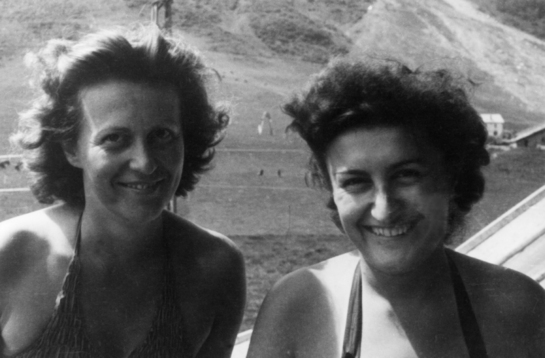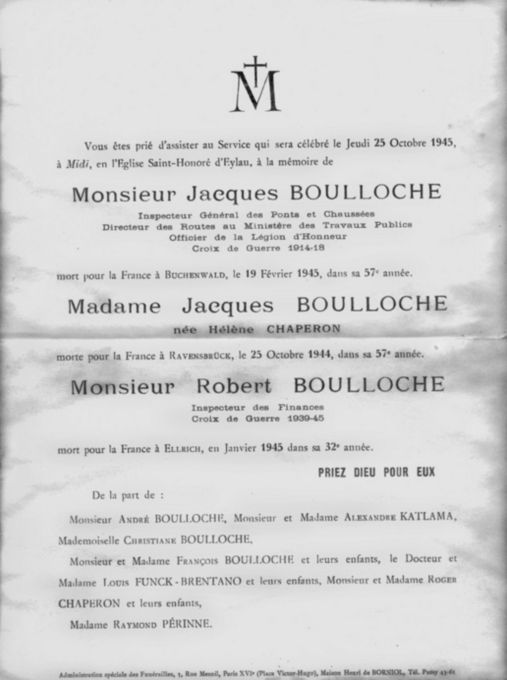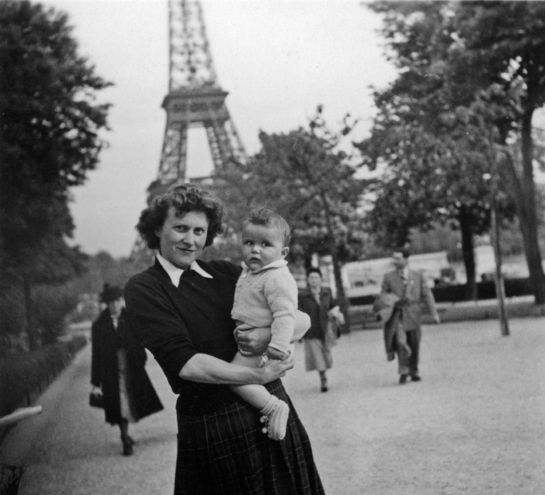The Cost of Courage (24 page)
Read The Cost of Courage Online
Authors: Charles Kaiser

Jacqueline and Alex Katlama. They became wife and husband shortly after André Boulloche returned to Paris in 1945.(
photo credit 1.18
)
André took a very different approach. Although he also married quite quickly and started a family, unlike his sisters he blamed himself explicitly for everything that had happened. Beyond his austere personality — a mournful contrast to the cheerful young man he had been before the war — two things made his attitude clear to everyone: For the rest of his life, he kept his hair shorn to a crew cut, and he wore a black tie every day, in memory of the dead.

Jacqueline and Christiane after the war. By the middle of 1947 both of them had gotten married.(
photo credit 1.19
)
In the months after the Liberation, there was an orgy of retribution against those who had collaborated with the Nazis. Women who had slept with the Germans had their heads shaved in the streets, while ten thousand Frenchmen were the victims of summary executions. Another one hundred thousand were tried in civilian and military courts, and about fifteen hundred of them were executed.
When he got back to Paris, André had an operation to repair the badly tended gunshot wound to his stomach. But he quickly discovered that nearly giving his life for the liberty of France was not enough to guarantee him a warm welcome when he returned. Several of his relatives made it clear that they blamed him and his
sisters for the deaths of their parents and their brother. That was something I learned from two of his nephews. Christiane never mentioned it to me. This was another taboo subject, within the larger taboo of silence the three of them embraced.
The hostility they faced from their family was probably one of the reasons he and Christiane decided to go to America for a year. André returned to his roots as a highway engineer and proposed a study of American traffic lights. He arranged for Christiane to accompany him as part of his team. “Being former
Résistants
opened a lot of doors” in 1946, Christiane explained.
Before they left on their trip, they organized a funeral mass for their parents and Robert at Saint-Honoré d’Eylau, a church eight hundred yards from their parents’ apartment. It was rare for half of a non-Jewish French family to have died in the German camps. Christiane remembered the service as a horrible event, an overflowing church with an endless parade of hands to shake afterward.
Because of heavy winter seas in the North Atlantic, their trip to America on a cargo ship took twenty-two days and came with plenty of seasickness. When they arrived in New York in December, they were astonished by the vitality of the city, especially after the drab postwar Paris they had left behind. But New York was freezing and covered in snow, and Christiane did not have anything to wear to cope with the weather.
“I went to Macy’s to buy a coat, and I couldn’t buy anything. Because there was too much! I was used to the stores in France, where there was three times nothing. So going to Macy’s was horrible! My head was spinning. It really had a strange effect on me. The next day was better. I had to buy something, because I was cold!”
Their American base was Washington, D.C. Their apartment was in a black neighborhood, which shocked their American friends. Christiane was oblivious of her neighbors, except for the annoying owner of the liquor store below them, who seemed
determined to sleep with her. They reconnected with Henry Kaiser in Washington, and met his wife, Paula. They also met my parents there for the first time. Christiane thought New York was much more interesting than Washington, and whenever she had a little money, she would take the train up to Manhattan.

The invitation for the memorial service for the family members who died in Germany. Christiane remembered it as a horrible event. Soon afterward she and her brother left for a trip to America.(
photo credit 1.20
)
When she got to the United States, Christiane realized she had a new duty: to educate Americans about what the Resistance had done in France. She traveled across the country, from New York to San Francisco, giving lectures about the Resistance to American college students.
Once again Christiane felt she was performing her duty. When she spoke about her experiences at a club in Washington, she got her picture in the
Washington Post.
“Fear of the Gestapo was transmitted to the children,” the
Post
reported her saying. “Nevertheless, the young people are eager to shake off that haunting fear, and eager to rebuild their lives.” One of the young people she was talking about, of course, was herself.
Christiane also learned that Americans generally knew absolutely nothing about how the Resistance had operated in France during the war — something that has barely changed seventy years later.
The brother-and-sister team stayed in America through the summer. André continued to suffer terrible guilt about the fate of half his family. On August 5, 1946, he revealed his feelings in his diary:
Why did my life have to be spared, when I was offering it so willingly, even cheerfully? And why did those three who wanted to live, and who loved life so passionately — why were their lives taken from them in the vilest, most brutal way imaginable? Why did I have to be left behind, I who had pushed the barge so far from the shore? Left behind without faith, without hope, but chained to life by my passionate love for my two sisters.…
When this unlikely and idiotic thing happened, my nature was awakened beneath a kind of false shell of wisdom. When the war came, I had, with great effort, offered the complete sacrifice of my life — mine and mine alone. When I left France [at the end of 1942], I was the only one in danger. With the near certainty of my imminent death, I felt the compensations that only a profound determination can provide.
Why didn’t I have the courage to remain absolutely alone when I returned to Paris? Why did I have to add the possibility of the sacrifice of my own family members to the near certainty of my own sacrifice?
AFTER CHRISTIANE
spoke at Smith College, the administrators there offered her a full scholarship if she would live in the Maison Française. But by the end of 1946, both she and André were eager to get back to France. When they returned, Christiane decided to take advantage of the new vogue for plastic surgery. Ignoring the objections of her friends, she got a nose job: “I’ve always done pretty much whatever I wanted to.”
André had become a Socialist because of his experience as an inmate in three concentration camps, where, in addition to the millions who perished in the gas chambers, thousands had died from forced labor. “It was when I was deported that I realized what life was like for a worker who is completely stupefied by his job, and whose only perspective is to keep working until he dies,” he explained. For the rest of his life, he continued to believe that society was unjust to the average worker, barely allowing him to subsist and making it “very, very difficult” to improve his station in life.
†
“We bourgeois learned some things during the war,” Christiane explained. “We discovered that poverty existed, and injustice existed. We were young, you know.”
In January 1947, there were two big events in the Boulloche family. That month another former Resistance member, Paul Ramadier, became the first prime minister of France’s Fourth Republic. André Boulloche knew Ramadier through mutual friends in the Resistance, and he was tapped for Ramadier’s cabinet, to handle economic issues. By the end of the year, André had become the prime minister’s chief of staff, an accomplishment that even impressed André — “I was very young for that job: I was 32.”
It was also in January that Jacques Boulloche’s college classmate from the Ecole polytechnique, Etienne Audibert, wrote an article about their time together at Buchenwald. Composed for the school’s alumni magazine, the article described how Jacques Boulloche had given up after he deduced that his wife had died in another camp. The piece included a harsh attack on their alma mater, because it had expelled anti-Nazi students from the class of 1941. Its tone was fiercely anticollaborator. It made the editor of the alumni magazine nervous because of the criticism of the school, and he initially refused to publish it.
Etienne Audibert telephoned Christiane and asked if he could meet with her to show her the piece. When he came over and she opened the door to greet him, she saw that he was accompanied by his dashing twenty-five-year-old son, Jean.
Another former student from Polytechnique, Jean Audibert had been able to get to England during the war and joined the Free French Navy. His ship engaged in antisubmarine warfare, and he had been offshore during the Normandy invasion. His mother had died in France while his father was imprisoned at Buchenwald.
Jean was taken with Christiane’s strength and wit, and she was charmed by his intelligence and his roaring laugh. By the end of lunch it was obvious they had hit it off.
Both of them agreed with Etienne that nothing in the twenty-five-hundred-word article should be altered. Eventually, the editor of the alumni magazine backed down and agreed to publish all of it.
Christiane and Jean had a whirlwind romance throughout the winter. When they met, they already shared the tragedy of the loss of their mothers during the war. And almost immediately they shared another one. Jean’s brother Pierre was a former
Résistant
who had gone into the army after the war and got shipped off to Indochina. At the beginning of 1947, he was killed there in an ambush. So now they also shared the loss of a brother.
Their common grief deepened their bond. Just six months after they met, Christiane was pregnant with their first child. Soon after that, they were married, on June 18, 1947. “Obviously, we chose the date for a reason,” said Christiane. It was the seventh anniversary of de Gaulle’s famous appeal from England after France’s collapse in 1940: the speech in which he declared “the flame of French Resistance must not, and shall not, die!”
The first member of the new generation arrived “two weeks early,” but Christiane never bothered to pretend that she wasn’t already pregnant when she got married. Catherine Hélène Julienne Jacqueline Audibert was born on February 3, 1948. (Naturally, just twenty-three years later, Catherine would become a judge.) Christiane considered her daughter’s birth a big event for the whole family: her first step in “turning the page.” Jacqueline’s first child, Eric Katlama, quickly followed seven months later.
On September 24, 1949, André married Anne Richard, whom he had met shortly after returning from the concentration camp. She had played a big role in getting him readjusted to society when he first returned to Paris. Eight months after their wedding, Anne gave birth to Robert Boulloche, named for André’s dead brother.
Then there was a torrent of natal activity. Noëlle Audibert joined Jean and Christiane’s hearth in 1949, and Pierre followed in 1951; and the following year Jacqueline had her second son, Michel Katlama.

Jacqueline and her firstborn, Eric Katlama, in 1949.(
photo credit 1.21
)
Just five years after Catherine’s birth, there were nine members of the new Boulloche-Audibert-Katlama generation. Jean and Christiane had their fourth and last, François, four years later.